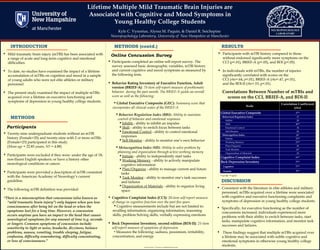
Vynorius, et al. (poster) Final
- 1. Kyle C. Vynorius, Alyssa M. Paquin, & Daniel R. Seichepine Neuropsychology Laboratory, University of New Hampshire at Manchester INTRODUCTION Mild traumatic brain injury (mTBI) has been associated with a range of acute and long-term cognitive and emotional difficulties. To date, no studies have examined the impact of a lifetime accumulation of mTBIs on cognition and mood in a sample of young adults who were not elite athletes or military personnel. The present study examined the impact of multiple mTBIs acquired over a lifetime on executive functioning and symptoms of depression in young healthy college students. METHODS Participants DISCUSSION Consistent with the literature in elite athletes and military personnel, mTBIs acquired over a lifetime were associated with cognitive and executive functioning complaints and symptoms of depression in young healthy college students. Specifically, for executive functioning as the number of concussions increased, individuals experienced more problems with their ability to switch between tasks, start tasks, manipulate cognitive information, and monitor task successes and failures. These findings suggest that multiple mTBIs acquired over a lifetime may be associated with subtle cognitive and emotional symptoms in otherwise young healthy college students. Lifetime Multiple Mild Traumatic Brain Injuries are Associated with Cognitive and Mood Symptoms in Young Healthy College Students Twenty-nine undergraduate students without an mTBI history (Female=25) and twenty-nine with 2 or more mTBIs (Female=23) participated in this study. (Mean age = 22.85 years, SD = 4.88) Participants were excluded if they were: under the age of 18; non-fluent English speakers; or have a history other neurological conditions or cancer. Participants were provided a description of mTBI consistent with the American Academy of Neurology’s current guideline. The following mTBI definition was provided: “There is a misconception that concussions (also known as “mild traumatic brain injury”) only happen when you lose consciousness after being hit on the head or when the symptoms last for a long time. However, a concussion occurs anytime you have an impact to the head that causes neurological symptoms for any amount of time (e.g. seconds or longer). Common symptoms of concussion include: sensitivity to light or noise, headache, dizziness, balance problems, nausea, vomiting, trouble sleeping, fatigue, confusion, difficulty remembering, difficulty concentrating, or loss of consciousness.” E-mail for Kyle C. Vynorius: kcv1000@wildcats.unh.edu METHODS (contd.) Online Concussion Survey Participants completed an online self-report survey. The survey assessed basic demographic variables, mTBI history and current cognitive and mood symptoms as measured by the following tests. Behavior Rating Inventory of Executive Function, Adult version (BRIEF-A): 75-item self-report measure of problematic behavior during the past month. The BRIEF-A yields an overall score as well as the following: Global Executive Composite (GEC): Summary score that incorporates all clinical scales of the BRIEF-A Behavior Regulation Index (BRI): Ability to maintain control of behavior and emotional responses Inhibit - ability to inhibit an impulse Shift - ability to switch focus between tasks Emotional Control - ability to control emotional responses Self-Monitor - ability to monitor one’s own behavior Metacognition Index (MI): Ability to solve problem by planning and organization through active working memory Initiate - ability to independently start tasks Working Memory - ability to actively manipulate cognitive information Plan/Organize - ability to manage current and future tasks Task Monitor - ability to monitor one’s task successes and failures Organization of Materials - ability to organize living space Cognitive Complaint Index (CCI): 20-item self-report measure of change in cognitive function over the past five years Cognitive measurements include but are not limited to: recalling information, organizing information, reasoning skills, problem Solving skills, verbally expressing emotions Beck Depression Inventory, second edition (BDI-II): 21-item self-report measure of symptoms of depression • Measures the following: sadness, pessimism, irritability, concentration, and energy RESULTS Correlations Between Number of mTBIs and scores on the CCI, BRIEF-A, and BDI-II Participants with mTBI history compared to those without endorsed significantly more symptoms on the CCI (p<.01), BRIEF-A (p<.05), and BDI (p<.05). In individuals with mTBIs, the number of injuries significantly correlated with scores on the CCI (rho=.64, p<.01), BRIEF-A (rho=.47, p<.01), and the BDI-II (rho=.53, p<.01). *= p<.05; **= p≤.01